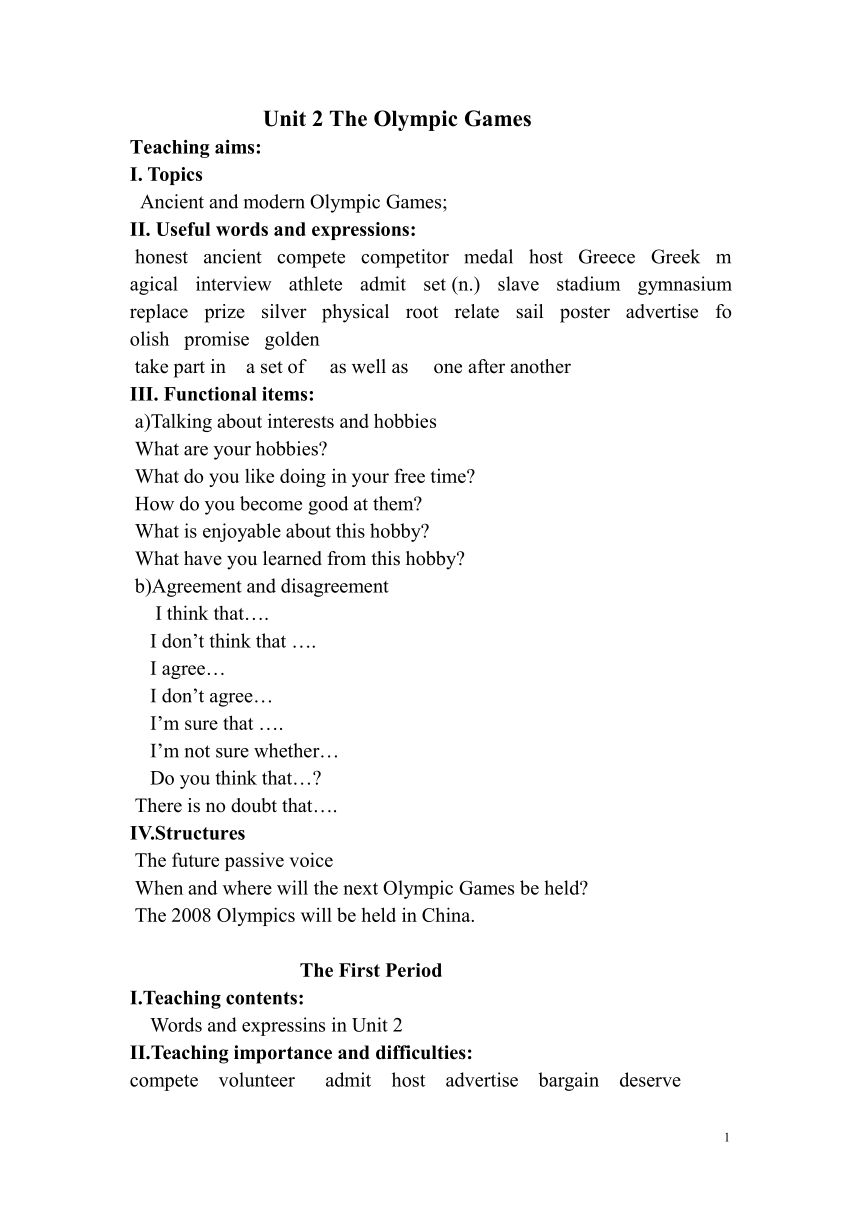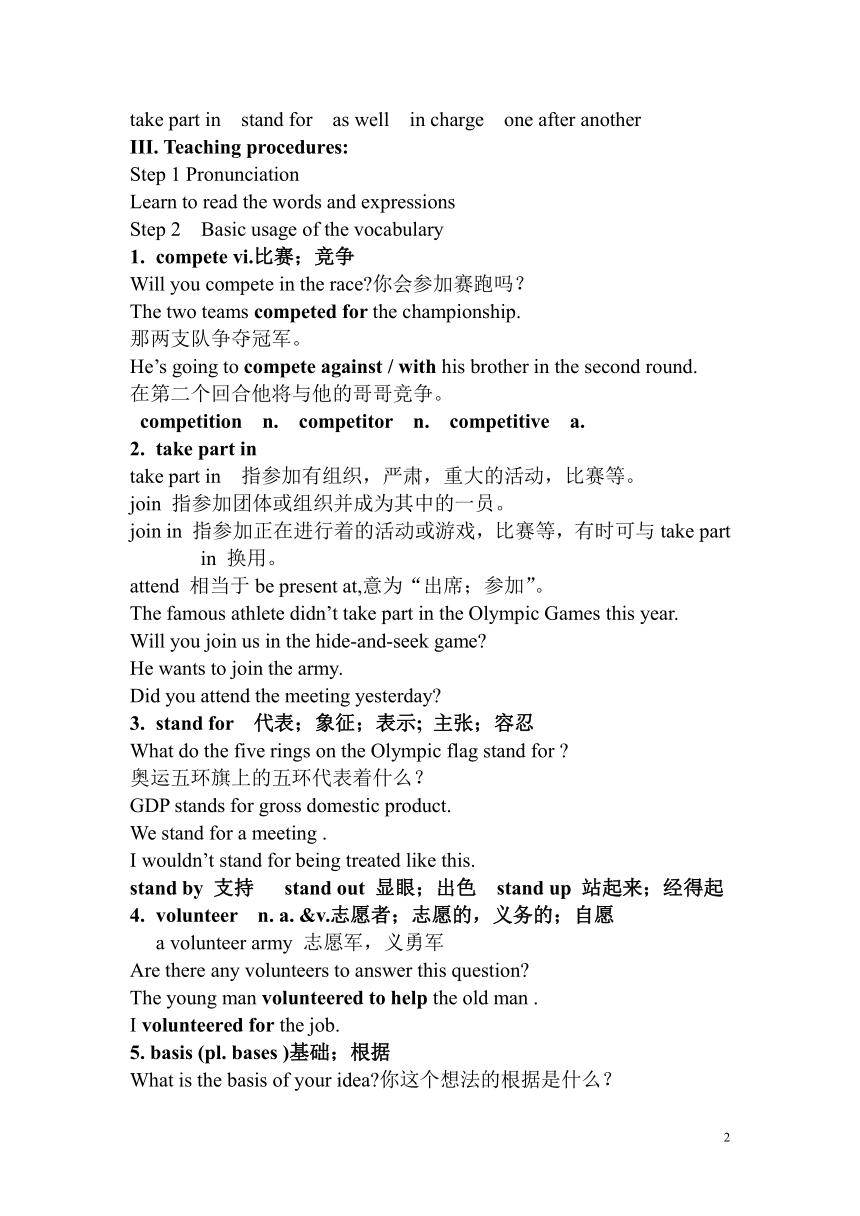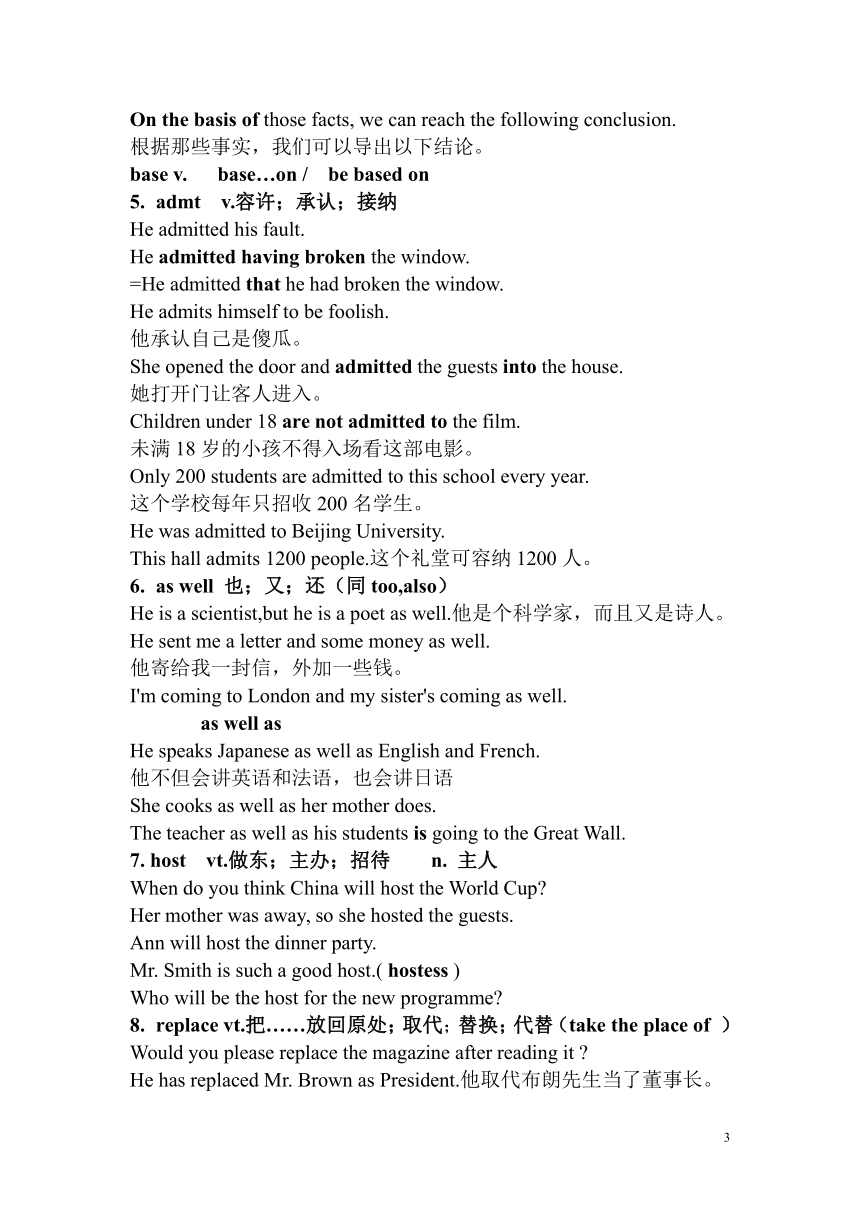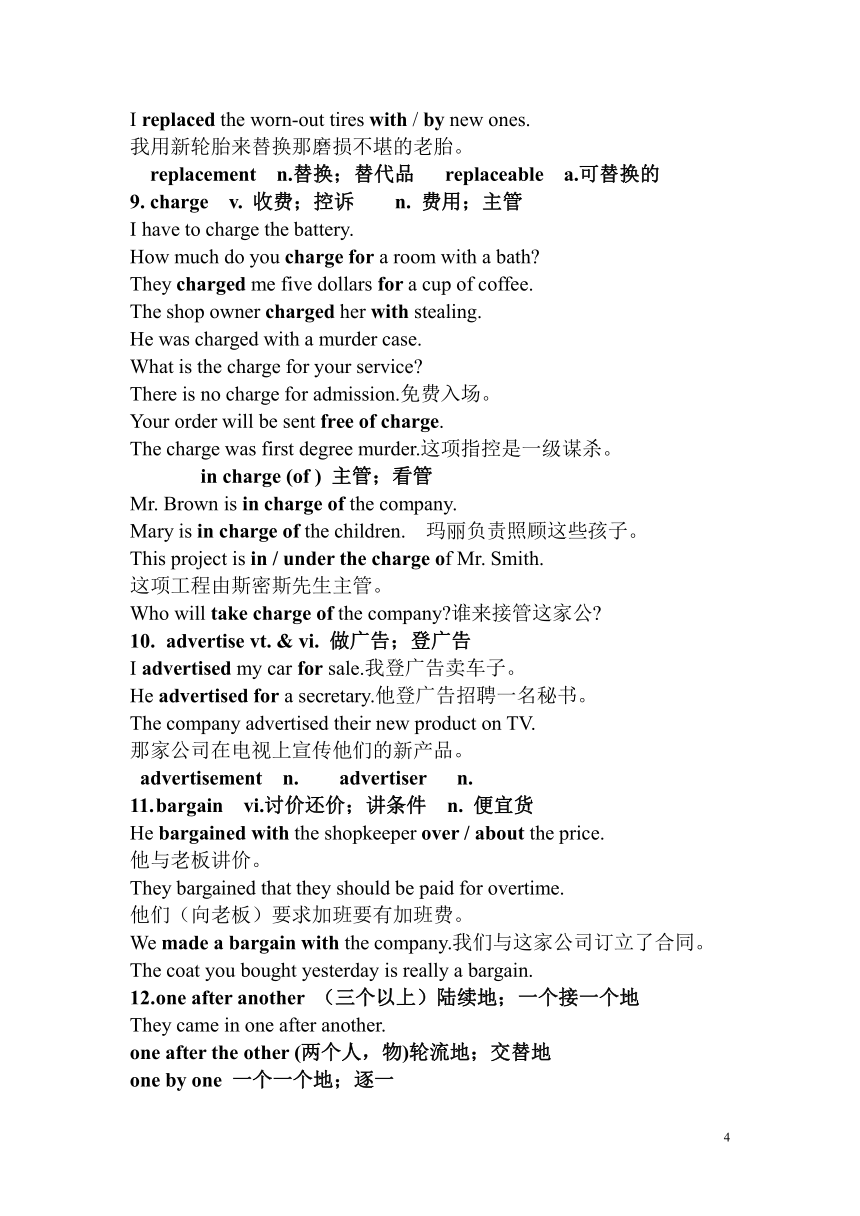Unit 2 The Olympic Games Words Warming up and reading和using language三课时教案
文档属性
| 名称 | Unit 2 The Olympic Games Words Warming up and reading和using language三课时教案 |

|
|
| 格式 | rar | ||
| 文件大小 | 16.6KB | ||
| 资源类型 | 教案 | ||
| 版本资源 | 人教版(新课程标准) | ||
| 科目 | 英语 | ||
| 更新时间 | 2009-12-09 00:00:00 | ||
图片预览




文档简介
Unit 2 The Olympic Games
Teaching aims:
I. Topics
Ancient and modern Olympic Games;
II. Useful words and expressions:
honest ancient compete competitor medal host Greece Greek magical interview athlete admit set (n.) slave stadium gymnasium replace prize silver physical root relate sail poster advertise foolish promise golden
take part in a set of as well as one after another
III. Functional items:
a)Talking about interests and hobbies
What are your hobbies
What do you like doing in your free time
How do you become good at them
What is enjoyable about this hobby
What have you learned from this hobby
b)Agreement and disagreement
I think that….
I don’t think that ….
I agree…
I don’t agree…
I’m sure that ….
I’m not sure whether…
Do you think that…
There is no doubt that….
IV.Structures
The future passive voice
When and where will the next Olympic Games be held
The 2008 Olympics will be held in China.
The First Period
I.Teaching contents:
Words and expressins in Unit 2
II.Teaching importance and difficulties:
compete volunteer admit host advertise bargain deserve
take part in stand for as well in charge one after another
III. Teaching procedures:
Step 1 Pronunciation
Learn to read the words and expressions
Step 2 Basic usage of the vocabulary
1. compete vi.比赛;竞争
Will you compete in the race 你会参加赛跑吗?
The two teams competed for the championship.
那两支队争夺冠军。
He’s going to compete against / with his brother in the second round.
在第二个回合他将与他的哥哥竞争。
competition n. competitor n. competitive a.
2. take part in
take part in 指参加有组织,严肃,重大的活动,比赛等。
join 指参加团体或组织并成为其中的一员。
join in 指参加正在进行着的活动或游戏,比赛等,有时可与take part in 换用。
attend 相当于be present at,意为“出席;参加”。
The famous athlete didn’t take part in the Olympic Games this year.
Will you join us in the hide-and-seek game
He wants to join the army.
Did you attend the meeting yesterday
3. stand for 代表;象征;表示; 主张;容忍
What do the five rings on the Olympic flag stand for
奥运五环旗上的五环代表着什么?
GDP stands for gross domestic product.
We stand for a meeting .
I wouldn’t stand for being treated like this.
stand by 支持 stand out 显眼;出色 stand up 站起来;经得起
4. volunteer n. a. &v.志愿者;志愿的,义务的;自愿
a volunteer army 志愿军,义勇军
Are there any volunteers to answer this question
The young man volunteered to help the old man .
I volunteered for the job.
5. basis (pl. bases )基础;根据
What is the basis of your idea 你这个想法的根据是什么?
On the basis of those facts, we can reach the following conclusion.
根据那些事实,我们可以导出以下结论。
base v. base…on / be based on
5. admt v.容许;承认;接纳
He admitted his fault.
He admitted having broken the window.
=He admitted that he had broken the window.
He admits himself to be foolish.
他承认自己是傻瓜。
She opened the door and admitted the guests into the house.
她打开门让客人进入。
Children under 18 are not admitted to the film.
未满18岁的小孩不得入场看这部电影。
Only 200 students are admitted to this school every year.
这个学校每年只招收200名学生。
He was admitted to Beijing University.
This hall admits 1200 people.这个礼堂可容纳1200人。
6. as well 也;又;还(同too,also)
He is a scientist,but he is a poet as well.他是个科学家,而且又是诗人。
He sent me a letter and some money as well.
他寄给我一封信,外加一些钱。
I'm coming to London and my sister's coming as well.
as well as
He speaks Japanese as well as English and French.
他不但会讲英语和法语,也会讲日语
She cooks as well as her mother does.
The teacher as well as his students is going to the Great Wall.
7. host vt.做东;主办;招待 n. 主人
When do you think China will host the World Cup
Her mother was away, so she hosted the guests.
Ann will host the dinner party.
Mr. Smith is such a good host.( hostess )
Who will be the host for the new programme
8. replace vt.把……放回原处;取代;替换;代替(take the place of )
Would you please replace the magazine after reading it
He has replaced Mr. Brown as President.他取代布朗先生当了董事长。
I replaced the worn-out tires with / by new ones.
我用新轮胎来替换那磨损不堪的老胎。
replacement n.替换;替代品 replaceable a.可替换的
9. charge v. 收费;控诉 n. 费用;主管
I have to charge the battery.
How much do you charge for a room with a bath
They charged me five dollars for a cup of coffee.
The shop owner charged her with stealing.
He was charged with a murder case.
What is the charge for your service
There is no charge for admission.免费入场。
Your order will be sent free of charge.
The charge was first degree murder.这项指控是一级谋杀。
in charge (of ) 主管;看管
Mr. Brown is in charge of the company.
Mary is in charge of the children. 玛丽负责照顾这些孩子。
This project is in / under the charge of Mr. Smith.
这项工程由斯密斯先生主管。
Who will take charge of the company 谁来接管这家公
10. advertise vt. & vi. 做广告;登广告
I advertised my car for sale.我登广告卖车子。
He advertised for a secretary.他登广告招聘一名秘书。
The company advertised their new product on TV.
那家公司在电视上宣传他们的新产品。
advertisement n. advertiser n.
11. bargain vi.讨价还价;讲条件 n. 便宜货
He bargained with the shopkeeper over / about the price.
他与老板讲价。
They bargained that they should be paid for overtime.
他们(向老板)要求加班要有加班费。
We made a bargain with the company.我们与这家公司订立了合同。
The coat you bought yesterday is really a bargain.
12. one after another (三个以上)陆续地;一个接一个地
They came in one after another.
one after the other (两个人,物)轮流地;交替地
one by one 一个一个地;逐一
13. deserve vt.&vi. 应受(报答或惩罚);值得(不用于进行式)
His brave act deserves praise.他的勇敢行为值得称赞。
She deserves the prize.她应得这个奖。
He deserves to be punished. 他罪有应得。
Your suggestion deserves considering.
=Your suggestion deserves to be considered.你的建议值得考虑。
IV. Homework
The Second Period
I.Teaching Content:
Warming up Reading comprehension
II.Teaching aims and demands:
1) To know the differences between ancient and modern Olympic Games.
2) Let students have the general idea about the Olympic Games’ history and relative information;
3) Train the students’ listening ability;
4)Improve the students’ reading ability by scanning (fast- reading) and intensive reading ;
III.Teaching aids:
A tape recorder
IV.Teaching procedures:
Step 1 Warming up:
T: Do you like to watch the Olympic Games on TV
What events do you like to watch
Ball games: badminton ; table tennis; tennis; volleyball; basketball
Field events: the high jump ;the long jump; the triple jump;
shot put;discus throw;javelin throw; etc.
Track events:long-distance running ;short-distance running;relay race;
hurdle race; marathon;walking race; etc.
Other events: swimming;diving;water ballet;skating;skiing;etc.
T: It sounds you are a fan of Olympics.Now let me ask you some questions to see how much you know about the Olympic Games.
1) Where did the ancient Olympic Games start
Olympia (Greece)
2) When did the ancient Olympic Games start ( In 776 BC)
3) When and where did the first modern Olympic Games start
Athens in 1896.
4) How often are the Olympic Games held (Every four years.)
5) What do the five rings on the Olympic flag stand for
The five continents.
6) What are the three words that show the spirits of the Olympic Games
Swifter, higher,stronger.
7) Who was China’s first gold medal winner and for what event
Xu Haifeng for shooting
8) When did China first take part in the Olympic Games
In 1932.
9) Which city in Asia first hosted the Olympic Games
Tokyo , Japan.
10) Who is the president of the International Olympic Committee
Jacques Rogge.
11) What are the official mascots for the Beijing Olympics
The Five Friendlies.
12) How many gold medals did China win in 2008 Beijing Olympic Games ( 51)
13) Where will the next Olympic Games be held
In London.
Step 2 Reading (学案)
Step 3 Language points:
1. Pausanias,who was a Greek witer about 2,000 years ago,has come on a magical journey on March 18th,2007 to find out about the presen-day Olympic Games.
1)go / start / come / be on a journey 进行旅行
My father was away on a journey.
2) find out about 弄清有关……的情况
The police are trying hard to find out about the accident.
2.I lived in what you call “Ancient Greece”and I used to write about the Olympic Games a long time ago.
我生活在你们所说的“古希腊”,我曾经写过2000年前奥林匹克运动会的情况。
what引起宾语从句,并在从句中作call的宾语,Ancient Greece作宾补。what相当于the place that,因此what 不能改为that,也不能改为where,因为where只能作状语。
After many days’voyage, they arrived in what is called America now.
After a long journey, they came to what was called “Gebi Desert”.
3.every four years 每四年
表示“每多少时间或距离;每隔多少时间或距离”
every +基数词+复数名词 / every + 序数词+单数名词
every four years = every fourth year
每两周/ 每隔一周
every two weeks=every second week=every other week
每隔几…… every few +复数名词
练习:
Usually medicine should be taken_________(每四小时).
Some of you go back home________(每隔一个星期).
He likes reading very much,so he goes to the bookshop_______
(每隔几天).
4.used to do 过去经常做某事/过去的状态
be /get / become used to doing sth. 习惯于
be used to do sth. 被用于做……
I’m still not used to getting up early.
Wood can be used to make paper.
The man got used to living in the countryside.
5.Our Greek cities used to compete against each other for the honor of winning.
for the honor of 为了……的荣誉
In honor of “为向...表示敬意”;为纪念...; 为祝贺...”
have the honor of doing sth / to do sth 荣幸地做某事
Washington, a state in the United States, was named in honor of one of the greatest American presidents.
May I have the honor of dancing with you
我能有幸和你跳支舞吗?
6. No other country could join in, nor could slaves or women.
其他国家都不能参加,奴隶和妇女也不行。
Nor do I think they should give it to any government.
I don’t know, nor do I care.
Nor是含有否定意义的副词,放在句首时,引起部分倒装句,意为“同样也不”。
英语中含有否定意义的副词及短语放在句首时,句中需要用部分倒装语序。这类副词及短语有:never,seldom,neither,nor,little,not,
hardly等.
Never before have I seen such a film.
Seldom does she go out alone.
Not a word did he say at the meeting.
* so +助动词/情态动词+sb./sth “…也…”
nor/neither +助动词/情态动词+sb./sth.
“……也不……”
She was a teacher , so was I.
My brother went to the park, so did I.
I didn’t go there ,nor / neither did she.
She can’t speak Japanese, nor / neither can I.
7.There’s just as much a competition among countries to host the Olympics as to win an Olympic medal.
国与国之间争取奥运会承办权的竞争就跟争夺奥运会金牌一样激烈。
as much + 名 + as + 名 (与……同样地……)
→ It’s as much your responsibility as mine.
这件事你和我一样都有责任。
I can carry as much paper as you can.你能搬多少纸我就能搬多少。
8.It’s still all about being able to run faster, jump higher and throw further.
farther 距离或时间上更远的, 是指具体
further 更远的 (=farther);程度上进一步的,是指抽象
We can’t go any farther without a rest.
We must get further information.
We need take further step to deal with the matter.
The Third Period
I.Teaching content:
Using language.
II.Teaching aims and demands:
Introduce the students to Greek literature and help them understand the problems that women had in Ancient Greece.
III.Teaching procedures:
Step1.Reading
Listen all the way through and ask students to write down the main idea.
Step 2 Comprehending
Complete Exx.1,2 and 3.
Step 3 Language points:
1. marry vt.结婚;嫁;娶
He married a pretty girl.
marry sb. to…
He married his daughter to a foreigner.
他把女儿嫁给了一个外国人。
(牧师等)为……主持婚礼
An old priest married them.一个老牧师为他们主持婚礼。
vi.结婚
She married very early.她结婚很早。
be married 已婚的 Is she married
get married 结婚 When did she get married
(和某人结婚,不能用with,要用to,也可以什么介词也不用。)
She married a doctor.
She was married to a doctor.
注意:
他们结婚十年了。
They have been married for ten years.
=The (got) married ten years ago.
=It is ten years since they got married.
2. promise vt.允诺;约定;答应
I promise to come.
I promise you not to say that.
He promised me a book.他许诺给我一本书。
He promised that he would help me.他答应要帮我忙。
n.( C ) 诺言;答应
make a promise 许下诺言 give a promise 答应
keep/carry out a promise 遵守/ 履行诺言
break a promise 违背诺言
promising adj.有希望的;有前途的
a promising young pianist 一个有前途的青年钢琴家
PAGE
9
Teaching aims:
I. Topics
Ancient and modern Olympic Games;
II. Useful words and expressions:
honest ancient compete competitor medal host Greece Greek magical interview athlete admit set (n.) slave stadium gymnasium replace prize silver physical root relate sail poster advertise foolish promise golden
take part in a set of as well as one after another
III. Functional items:
a)Talking about interests and hobbies
What are your hobbies
What do you like doing in your free time
How do you become good at them
What is enjoyable about this hobby
What have you learned from this hobby
b)Agreement and disagreement
I think that….
I don’t think that ….
I agree…
I don’t agree…
I’m sure that ….
I’m not sure whether…
Do you think that…
There is no doubt that….
IV.Structures
The future passive voice
When and where will the next Olympic Games be held
The 2008 Olympics will be held in China.
The First Period
I.Teaching contents:
Words and expressins in Unit 2
II.Teaching importance and difficulties:
compete volunteer admit host advertise bargain deserve
take part in stand for as well in charge one after another
III. Teaching procedures:
Step 1 Pronunciation
Learn to read the words and expressions
Step 2 Basic usage of the vocabulary
1. compete vi.比赛;竞争
Will you compete in the race 你会参加赛跑吗?
The two teams competed for the championship.
那两支队争夺冠军。
He’s going to compete against / with his brother in the second round.
在第二个回合他将与他的哥哥竞争。
competition n. competitor n. competitive a.
2. take part in
take part in 指参加有组织,严肃,重大的活动,比赛等。
join 指参加团体或组织并成为其中的一员。
join in 指参加正在进行着的活动或游戏,比赛等,有时可与take part in 换用。
attend 相当于be present at,意为“出席;参加”。
The famous athlete didn’t take part in the Olympic Games this year.
Will you join us in the hide-and-seek game
He wants to join the army.
Did you attend the meeting yesterday
3. stand for 代表;象征;表示; 主张;容忍
What do the five rings on the Olympic flag stand for
奥运五环旗上的五环代表着什么?
GDP stands for gross domestic product.
We stand for a meeting .
I wouldn’t stand for being treated like this.
stand by 支持 stand out 显眼;出色 stand up 站起来;经得起
4. volunteer n. a. &v.志愿者;志愿的,义务的;自愿
a volunteer army 志愿军,义勇军
Are there any volunteers to answer this question
The young man volunteered to help the old man .
I volunteered for the job.
5. basis (pl. bases )基础;根据
What is the basis of your idea 你这个想法的根据是什么?
On the basis of those facts, we can reach the following conclusion.
根据那些事实,我们可以导出以下结论。
base v. base…on / be based on
5. admt v.容许;承认;接纳
He admitted his fault.
He admitted having broken the window.
=He admitted that he had broken the window.
He admits himself to be foolish.
他承认自己是傻瓜。
She opened the door and admitted the guests into the house.
她打开门让客人进入。
Children under 18 are not admitted to the film.
未满18岁的小孩不得入场看这部电影。
Only 200 students are admitted to this school every year.
这个学校每年只招收200名学生。
He was admitted to Beijing University.
This hall admits 1200 people.这个礼堂可容纳1200人。
6. as well 也;又;还(同too,also)
He is a scientist,but he is a poet as well.他是个科学家,而且又是诗人。
He sent me a letter and some money as well.
他寄给我一封信,外加一些钱。
I'm coming to London and my sister's coming as well.
as well as
He speaks Japanese as well as English and French.
他不但会讲英语和法语,也会讲日语
She cooks as well as her mother does.
The teacher as well as his students is going to the Great Wall.
7. host vt.做东;主办;招待 n. 主人
When do you think China will host the World Cup
Her mother was away, so she hosted the guests.
Ann will host the dinner party.
Mr. Smith is such a good host.( hostess )
Who will be the host for the new programme
8. replace vt.把……放回原处;取代;替换;代替(take the place of )
Would you please replace the magazine after reading it
He has replaced Mr. Brown as President.他取代布朗先生当了董事长。
I replaced the worn-out tires with / by new ones.
我用新轮胎来替换那磨损不堪的老胎。
replacement n.替换;替代品 replaceable a.可替换的
9. charge v. 收费;控诉 n. 费用;主管
I have to charge the battery.
How much do you charge for a room with a bath
They charged me five dollars for a cup of coffee.
The shop owner charged her with stealing.
He was charged with a murder case.
What is the charge for your service
There is no charge for admission.免费入场。
Your order will be sent free of charge.
The charge was first degree murder.这项指控是一级谋杀。
in charge (of ) 主管;看管
Mr. Brown is in charge of the company.
Mary is in charge of the children. 玛丽负责照顾这些孩子。
This project is in / under the charge of Mr. Smith.
这项工程由斯密斯先生主管。
Who will take charge of the company 谁来接管这家公
10. advertise vt. & vi. 做广告;登广告
I advertised my car for sale.我登广告卖车子。
He advertised for a secretary.他登广告招聘一名秘书。
The company advertised their new product on TV.
那家公司在电视上宣传他们的新产品。
advertisement n. advertiser n.
11. bargain vi.讨价还价;讲条件 n. 便宜货
He bargained with the shopkeeper over / about the price.
他与老板讲价。
They bargained that they should be paid for overtime.
他们(向老板)要求加班要有加班费。
We made a bargain with the company.我们与这家公司订立了合同。
The coat you bought yesterday is really a bargain.
12. one after another (三个以上)陆续地;一个接一个地
They came in one after another.
one after the other (两个人,物)轮流地;交替地
one by one 一个一个地;逐一
13. deserve vt.&vi. 应受(报答或惩罚);值得(不用于进行式)
His brave act deserves praise.他的勇敢行为值得称赞。
She deserves the prize.她应得这个奖。
He deserves to be punished. 他罪有应得。
Your suggestion deserves considering.
=Your suggestion deserves to be considered.你的建议值得考虑。
IV. Homework
The Second Period
I.Teaching Content:
Warming up Reading comprehension
II.Teaching aims and demands:
1) To know the differences between ancient and modern Olympic Games.
2) Let students have the general idea about the Olympic Games’ history and relative information;
3) Train the students’ listening ability;
4)Improve the students’ reading ability by scanning (fast- reading) and intensive reading ;
III.Teaching aids:
A tape recorder
IV.Teaching procedures:
Step 1 Warming up:
T: Do you like to watch the Olympic Games on TV
What events do you like to watch
Ball games: badminton ; table tennis; tennis; volleyball; basketball
Field events: the high jump ;the long jump; the triple jump;
shot put;discus throw;javelin throw; etc.
Track events:long-distance running ;short-distance running;relay race;
hurdle race; marathon;walking race; etc.
Other events: swimming;diving;water ballet;skating;skiing;etc.
T: It sounds you are a fan of Olympics.Now let me ask you some questions to see how much you know about the Olympic Games.
1) Where did the ancient Olympic Games start
Olympia (Greece)
2) When did the ancient Olympic Games start ( In 776 BC)
3) When and where did the first modern Olympic Games start
Athens in 1896.
4) How often are the Olympic Games held (Every four years.)
5) What do the five rings on the Olympic flag stand for
The five continents.
6) What are the three words that show the spirits of the Olympic Games
Swifter, higher,stronger.
7) Who was China’s first gold medal winner and for what event
Xu Haifeng for shooting
8) When did China first take part in the Olympic Games
In 1932.
9) Which city in Asia first hosted the Olympic Games
Tokyo , Japan.
10) Who is the president of the International Olympic Committee
Jacques Rogge.
11) What are the official mascots for the Beijing Olympics
The Five Friendlies.
12) How many gold medals did China win in 2008 Beijing Olympic Games ( 51)
13) Where will the next Olympic Games be held
In London.
Step 2 Reading (学案)
Step 3 Language points:
1. Pausanias,who was a Greek witer about 2,000 years ago,has come on a magical journey on March 18th,2007 to find out about the presen-day Olympic Games.
1)go / start / come / be on a journey 进行旅行
My father was away on a journey.
2) find out about 弄清有关……的情况
The police are trying hard to find out about the accident.
2.I lived in what you call “Ancient Greece”and I used to write about the Olympic Games a long time ago.
我生活在你们所说的“古希腊”,我曾经写过2000年前奥林匹克运动会的情况。
what引起宾语从句,并在从句中作call的宾语,Ancient Greece作宾补。what相当于the place that,因此what 不能改为that,也不能改为where,因为where只能作状语。
After many days’voyage, they arrived in what is called America now.
After a long journey, they came to what was called “Gebi Desert”.
3.every four years 每四年
表示“每多少时间或距离;每隔多少时间或距离”
every +基数词+复数名词 / every + 序数词+单数名词
every four years = every fourth year
每两周/ 每隔一周
every two weeks=every second week=every other week
每隔几…… every few +复数名词
练习:
Usually medicine should be taken_________(每四小时).
Some of you go back home________(每隔一个星期).
He likes reading very much,so he goes to the bookshop_______
(每隔几天).
4.used to do 过去经常做某事/过去的状态
be /get / become used to doing sth. 习惯于
be used to do sth. 被用于做……
I’m still not used to getting up early.
Wood can be used to make paper.
The man got used to living in the countryside.
5.Our Greek cities used to compete against each other for the honor of winning.
for the honor of 为了……的荣誉
In honor of “为向...表示敬意”;为纪念...; 为祝贺...”
have the honor of doing sth / to do sth 荣幸地做某事
Washington, a state in the United States, was named in honor of one of the greatest American presidents.
May I have the honor of dancing with you
我能有幸和你跳支舞吗?
6. No other country could join in, nor could slaves or women.
其他国家都不能参加,奴隶和妇女也不行。
Nor do I think they should give it to any government.
I don’t know, nor do I care.
Nor是含有否定意义的副词,放在句首时,引起部分倒装句,意为“同样也不”。
英语中含有否定意义的副词及短语放在句首时,句中需要用部分倒装语序。这类副词及短语有:never,seldom,neither,nor,little,not,
hardly等.
Never before have I seen such a film.
Seldom does she go out alone.
Not a word did he say at the meeting.
* so +助动词/情态动词+sb./sth “…也…”
nor/neither +助动词/情态动词+sb./sth.
“……也不……”
She was a teacher , so was I.
My brother went to the park, so did I.
I didn’t go there ,nor / neither did she.
She can’t speak Japanese, nor / neither can I.
7.There’s just as much a competition among countries to host the Olympics as to win an Olympic medal.
国与国之间争取奥运会承办权的竞争就跟争夺奥运会金牌一样激烈。
as much + 名 + as + 名 (与……同样地……)
→ It’s as much your responsibility as mine.
这件事你和我一样都有责任。
I can carry as much paper as you can.你能搬多少纸我就能搬多少。
8.It’s still all about being able to run faster, jump higher and throw further.
farther 距离或时间上更远的, 是指具体
further 更远的 (=farther);程度上进一步的,是指抽象
We can’t go any farther without a rest.
We must get further information.
We need take further step to deal with the matter.
The Third Period
I.Teaching content:
Using language.
II.Teaching aims and demands:
Introduce the students to Greek literature and help them understand the problems that women had in Ancient Greece.
III.Teaching procedures:
Step1.Reading
Listen all the way through and ask students to write down the main idea.
Step 2 Comprehending
Complete Exx.1,2 and 3.
Step 3 Language points:
1. marry vt.结婚;嫁;娶
He married a pretty girl.
marry sb. to…
He married his daughter to a foreigner.
他把女儿嫁给了一个外国人。
(牧师等)为……主持婚礼
An old priest married them.一个老牧师为他们主持婚礼。
vi.结婚
She married very early.她结婚很早。
be married 已婚的 Is she married
get married 结婚 When did she get married
(和某人结婚,不能用with,要用to,也可以什么介词也不用。)
She married a doctor.
She was married to a doctor.
注意:
他们结婚十年了。
They have been married for ten years.
=The (got) married ten years ago.
=It is ten years since they got married.
2. promise vt.允诺;约定;答应
I promise to come.
I promise you not to say that.
He promised me a book.他许诺给我一本书。
He promised that he would help me.他答应要帮我忙。
n.( C ) 诺言;答应
make a promise 许下诺言 give a promise 答应
keep/carry out a promise 遵守/ 履行诺言
break a promise 违背诺言
promising adj.有希望的;有前途的
a promising young pianist 一个有前途的青年钢琴家
PAGE
9
